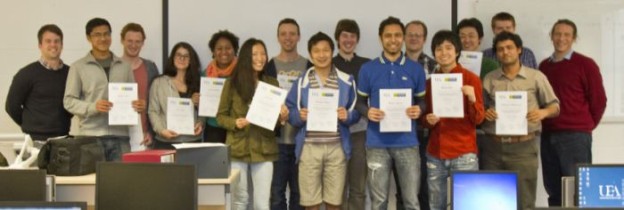Geospatial Training Solutions offers a variety of courses on GIS and spatial data at a range of different locations. Below is a list of the courses coming up, and a link to sign up (where available). If you would like to participate in any of the courses, please either email nick@geospatialtrainingsolutions.co.uk or use the contact form on this website. Our courses are constantly being developed to take advantage of the latest changes in QGIS and R; if you would like a course run for a group of you, then please contact us to arrange a quote.

Introduction to Spatial Data & Using R as a GIS
In this one day course we will explore how to use R to import, manage and process spatial data. We will also cover the process of making choropleth maps, as well as some basic spatial analysis. Finally, we will cover the use of loops to make multiple maps quickly and easily, one of the major benefits of using a scripting language to make maps, rather than traditional graphic point-and-click interface.
No previous experience of coding is required, although participants would benefit from some experience of using spatial data (e.g. Google Maps).
Tue 25th and Wed 26th June 2024, 10am – 1pm, online.
“It was a great introduction – I came to the session with NO understanding and have left feeling much more confident to learn more on my own.”
Olivia Reeves-O’Toole, PhD Student, University of Liverpool
Confident Spatial Analysis and Statistics in R & GeoDa
In this two part course we will show you how to prepare and conduct spatial analysis on a variety of spatial data in R, including a range of spatial overlays and data processing techniques. We will also cover how to use GeoDa to perform exploratory spatial data analysis, including making use of linked displays and measures of spatial autocorrelation and clustering.
This course can follow-on from the ‘Introduction to Spatial Data & Using R as a GIS’ course, or be run independently if participants have some previous knowledge of R / RStudio and spatial data.
Tue 16th and Wed 17th July, 2024, 10am – 1pm, online.
Introduction to GIS, Geospatial Data and Spatial Analysis
In this week long (17.5 hours) course at the Essex Summer School, you will gain an in-depth knowledge of spatial data, and how it can be used in a variety of social science applications. You will learn how spatial data is structured, how and where it can be used and how and where it cannot be used. By the end of the course you will be able to apply the skills you have learnt in your own area of study, and there will be time during the course provided to start this with me available to help.
Course description, outline and learning objectives (PDF, 160KB).
Mon 22nd – Fri 26th July, 2024, 10am – 1:30pm, hybrid.
Introduction to QGIS: Spatial Data and Spatial Analysis
In this four session course you will learn what GIS is, how it works and how you can use it to create maps and perform spatial analysis. We assume no prior knowledge of GIS and you will learn how to get data into the GIS, how to produce maps using your own data and what you can and cannot do with spatial data. You will also learn how to work with a variety of different data sources and types (including XY coordinate data and address or postcode data) and using spatial overlays, point in polygon analysis and spatial joins.
This course requires no prior knowledge of GIS or spatial data. A level of basic computer experience is required; such as using websites, Word and saving & moving files.
No dates scheduled, join my mailing list to hear when new dates are confirmed.
Introduction to QGIS: Understanding and Presenting Spatial Data
In this two part introductory course we will give you an overview on how GIS works, and what we can and can’t do with spatial data. We assume no prior knowledge of GIS and will explain how to get data into the GIS as well as how to produce maps using your own data.
This course requires no prior knowledge of GIS or spatial data. A level of basic computer experience is required; such as using websites, Word and saving & moving files.
Attendees on this course can choose to receive a Certificate of Completion, certified by QGIS for a donation of €20. Geospatial Training Solutions is a QGIS approved training organisation, and a donation of €20 for each participant will be made to the QGIS Foundation, supporting the development of QGIS.
Confident Spatial Analysis in QGIS
This intermediate two part course will develop your skills of using spatial data, including collating data from a variety of sources including XY coordinate data and address or postcode based data. We will also cover using spatial overlays, point-in-polygon analysis and spatial joins.
This course can follow-on from the Introduction to QGIS course above, or be run independently if the participants have some previous knowledge of QGIS and spatial data.
Attendees on this course can choose to receive a Certificate of Completion, certified by QGIS for a donation of €20. Geospatial Training Solutions is a QGIS approved training organisation, and a donation of €20 for each participant will be made to the QGIS Foundation, supporting the development of QGIS.
Exploring, visualising and mapping data: an R course for 15 beginners
Our three day course is suitable for everyone: academics, students and public sector and commercial professionals. We introduce you to R, one of the most frequently-used tools in academic research. It is a coding language that gives you complete control over your data and provides the freedom you need to do your data exploration, cleaning, analysis and visualisation all in one place. It is free, easy to use and supported by an international network of experts who will answer questions posted online by anyone. We make R simple, straightforward and exciting, invariably converting those who believe that coding is not for them, while increasing the capabilities of those with some experience.
No previous experience of coding, spatial data or GIS is required.
Course description and outline.
Web Mapping
In this one-day course we will explore Web Mapping and show you how to use a variety of different tools to display and communicate spatial information We will have a recap of the basics of spatial data and focus on how we get a variety of different types of data into web mapping platforms We will review some of the different platforms available and spend most of the time looking at the MapBox platform.
No experience of using spatial data is needed for this course, but some experience would be beneficial. No experience of coding is needed for this course.
Using Spatial Data from Social Media
In this one-day course we will consider how data from different social media platforms could be used for spatial analysis. With social media now generating significant volumes of data it is a great resource for research in a wide range of different social science areas. We will primarily focus on Twitter data explore what spatial elements there are within the data and discuss how best to show and analyse these in a GIS. We will also cover a quick recap on spatial data.
Some experience of working with spatial data is needed for this course. No experience of coding is needed for this course, but some experience would be beneficial.
Advanced GIS Training Methods: IUC and K-means Clustering
In these two morning sessions, we will discuss the Internet User Classification and Retail Centre Typology datasets from the CDRC and the methods used to create them. K-means clustering is used to create many different data sets, including the geodemographic classification, OAC. We will discuss the IUC and RCT datasets, how and why they were created, and what they can be used for. We will also discuss and show you how to use the K-means clustering method to create your own classification, using IUC as an example.
The training will consist of the 2 x 3 hour sessions which will run over Zoom. These will consist of a small section of presentations, some seminar style discussions and 1-to-1 supported practical work. There will also be a short video you will be required to watch before the course. We will work with R and RStudio.
If you have not used R before, or would like a refresher, a short R as a GIS course will be available for you to complete in your own time before the course. We may ask participants to complete a short quiz to confirm the required skill level in R, and to then complete the refresher course before attending the session if needed.

Bespoke Courses
We can also develop a bespoke course, custom to your requirements, time-frame and budget.
Please call 01209 808910 or email nick@geospatialtrainingsolutions.co.uk to have a chat with Nick about which courses would be most appropriate for you and how we could deliver a course for your organisation.
